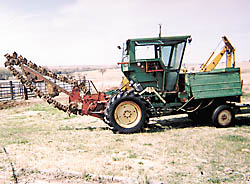
After wearing out two ditching units that were old when he bought them, Wayne Volk was excited about buying a used Ditch Witch in 1980. But it didn't have the power he wanted, and by 1991 he had scrounged enough parts to build his own trencher. The Bloomington, Neb., man estimates he's buried about 75,000 feet of pipe with it since then.
"Instead of miles per hour like a tractor, a trencher has to travel feet per minute," says Volk, explaining why he put together parts from so many different machines.
He started with an old, retired Minneapolis Moline combine and used the cab, engine, power steering and hydrostat transmission. He added an old John Deere drive and front axle, and a 4-speed transmission from a Studebaker to get seven speeds and the ability to drive slowly. He used the transmission and clutch assembly from a 1948 self-propelled Cockschutt combine to operate the digger chains on the Ditch Witch attachment on the back.
Volk worked on his trencher during his free time for about nine months and was pleased with the results.
"It went slow enough, and the 383 Chrysler engine gave me all the power that I needed," he says, noting it was a huge improvement over the Ditch Witch.""The Ditch Witch was supposed to have a 60 hp engine, but I told everyone it was 60 ponies, and 20 died, and I was dragging them along."
The only thing he doesn't like about his homemade trencher is that the road speed is slower than he likes, so he hauls his trencher on a trailer when he moves from job to job.
The benefits outweigh that problem. Volk appreciates the added comfort of working in a heated cab, and trenching is made easier with a used Pathfinder Freedom Drive he hooked into the hydraulic steering and attached to the front. Volk marks a shallow line by securing a shovel to his pickup's bumper and driving where he wants the trencher to go. The Freedom Drive follows the line -- whether it's straight or curved -- for hands-free steering.
"I wouldn't trade this ditcher with another one produced commercially," Volk says. After years of work, it's still doing the job. Though he's old enough to be retired, Volk enjoys digging trenches and takes on jobs installing underground irrigation and piping rural water to cattle water tanks.
